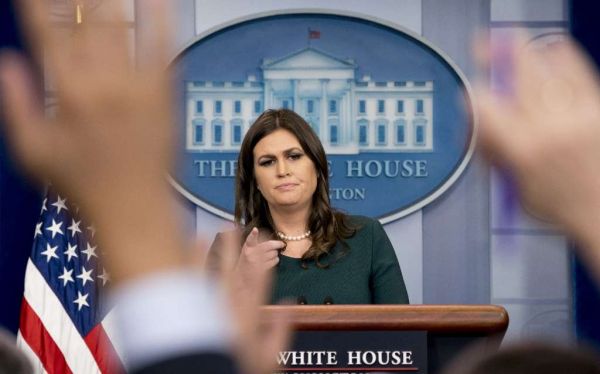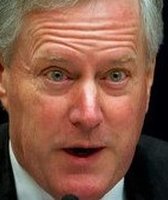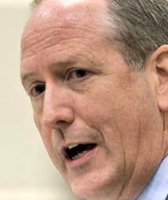Get PolitiFact in your inbox.
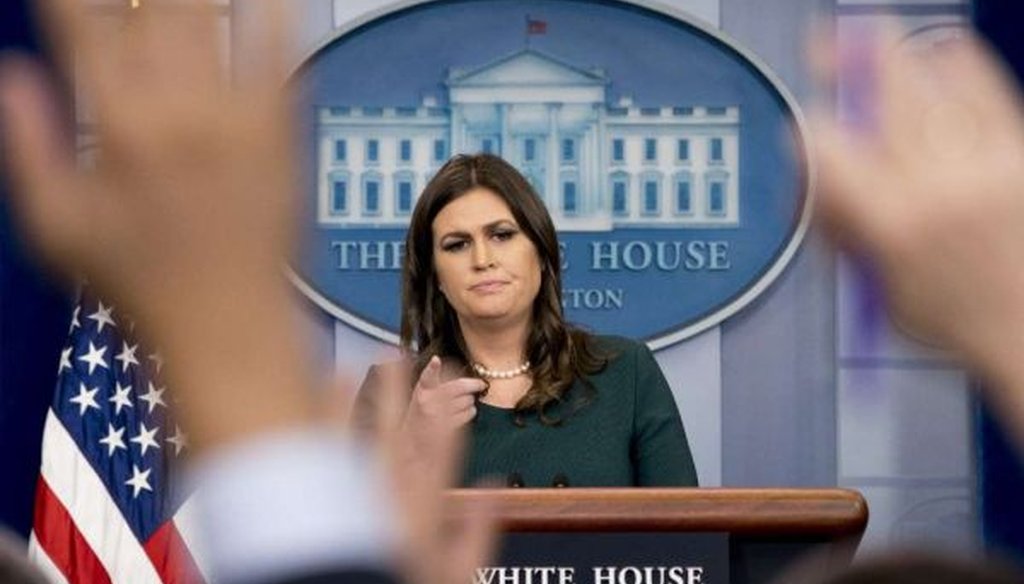
White House Press Secretary Sarah Huckabee Sanders calls on a member of the media during the daily White House briefing on Oct. 20, 2017. (AP/Andrew Harnik)
White House Press Secretary Sarah Huckabee Sanders told special counsel Robert Mueller’s team that she gave false information during a press briefing. Now, some are calling for her removal.
Back in May 2017, Sanders told reporters that "countless" FBI agents expressed their support for former FBI Director James Comey’s firing. She subsequently repeated the talking point.
But the redacted Mueller report says her remarks were "not founded on anything." When investigators questioned Sanders, she admitted there was no basis for her statement, blaming the falsehoods on a "slip of the tongue" and "the heat of the moment."
White House correspondents have criticized Sanders’ credibility, with one reporter, April Ryan, calling for her firing.
We decided to look into past press secretaries’ falsehoods to understand the significance of Sanders’ actions.
Past untruths from the press secretary’s podium
Former presidents — from Woodrow Wilson to Richard Nixon — famously have had strained relationships with the press. But what does it mean for the president’s official spokesperson to tell untruths?
Jay Carney, Barack Obama’s press secretary, echoed Obama’s claim that Americans could keep their current health care plans under the Affordable Care Act. As Obama’s plan moved from idea to legislative reality, the statement became inaccurate. Ultimately, the statement was repeated dozens of times with insufficient context, earning PolitiFact’s Lie of the Year for 2013.
But in most instances we tracked down, press secretaries have lied in order to protect American security or military interests abroad. In 1971, when asked if American and South Vietnamese forces were preparing to invade Laos, Nixon’s Ron Ziegler replied, "The president is aware of what is going on in Southeast Asia. … That is not to say anything is going on in Southeast Asia."
Jody Powell, Jimmy Carter’s press secretary, garnered criticism over his handling of the botched attempt to save hostages from the American embassy in Tehran. In the weeks leading up to the rescue mission, Powell assured the press that the idea had been abandoned.
During George W. Bush’s presidency, Ari Fleischer suggested there were weapons of mass destruction in Iraq; that proved false. Both Fleischer, as the face of the war effort, and the press have been accused of marshalling the American people into war. He has since attributed his statements to a "major intelligence failure."
Mike McCurry, Bill Clinton’s press secretary, told PolitiFact last year, "These questions about national security are the most sensitive and create the dilemma. You tap dance, but never lie."
‘Culture of lying’
Those who study political communications and public relations draw a bright line between spinning and lying, according to Northwestern University political science professor Larry Stuelpnagel. While it’s common for press secretaries to present facts that help justify the president’s actions or demonstrate widespread support for a policy, lying is frowned upon because it damages the credibility of the entire administration.
Sanders’ mistakes are not an isolated case within the Trump administration. Her predecessor, Sean Spicer, told falsehoods about voter fraud, surveillance of Trump Tower, and the crowd size at Trump’s inauguration. Hope Hicks, Trump’s former communications director, testified to Congress that she told "white lies" while representing the president.
The Mueller report says that Sanders spoke with the president after the Comey briefing and that Trump "told her she did a good job and did not point out any inaccuracies in her comments."
Perhaps the most pertinent historical example of a press secretary lying to protect their boss came from Ziegler, who dismissed Watergate as a "third-rate alleged burglary attempt." When Washington Post reporters Bob Woodward and Carl Bernstein kept digging, Ziegler accused them of "shabby journalism" and "character assassination."
In a piece for Politico Magazine, John Farrell, who authored the biography "Richard Nixon: The Life," wrote that the president "viewed Ziegler as a tool and a mouthpiece, not a trusted confidant."
Sanders has yet to acknowledge that she gave reporters false information about FBI agents expressing support for Comey’s firing. Instead, she’s on the offensive.
On ABC’s Good Morning America, George Stephanopoulos told Sanders, "The report exposes a culture of lying at the White House — the president lying, telling others to lie, and it calls your personal credibility into question."
In response, Sanders doubled down on her earlier comment, explaining that current and former members of the FBI "continue to speak out and send notice to the White House of their agreement with the president’s decision."
Stephanopoulos, who served as Clinton’s communications director, pressed her, "Why can’t you acknowledge that what you said then was not true?"
"I said that the word I used, 'countless,' and I also said — if you look at what's in quotations from me — it's that, and it's that it was 'in the heat of moment,' meaning that it wasn't a scripted talking point. I'm sorry that I wasn't a robot like the Democrat Party," Sanders replied.
Our Sources
Phone interview, Larry Stuelpnagel, political science professor at Northwestern University, April 23, 2019
Department of Justice, "Report on the Investigation into Russian Interference in the 2016 Presidential Election," March 2019
ABC, Good Morning America, April 19, 2019
PolitiFact, "Hope Hicks and the history of White House 'white lies,'" March 1, 2018
The Hill, "Sarah Sanders made false statements to press on Comey firing, Mueller says," April 18, 2019
New York Times, "Sanders’s ‘Slip of the Tongue’ Would Be a Problem in Some White Houses. Not Trump’s," April 19, 2019
Politico Magazine, "The Most Abused Press Secretary in History," March 19, 2017
New Yorker, "Jody," September 16, 2009
Washington Post, "‘Have respect for the dead’: Ari Fleischer faces backlash after defending Bush on Iraq War anniversary," March 20, 2019
PolitiFact, "Lie of the Year: 'If you like your health care plan, you can keep it,'" December 12, 2013
Washington Post, "What to do about Sarah Sanders? White House reporters have a few ideas," April 22, 2019
New Yorker, "Sean Spicer Will Be Remembered for His Lies," July 21, 2017
History.com, "Presidential Feuds With the Media Are Nothing New," September 3, 2018


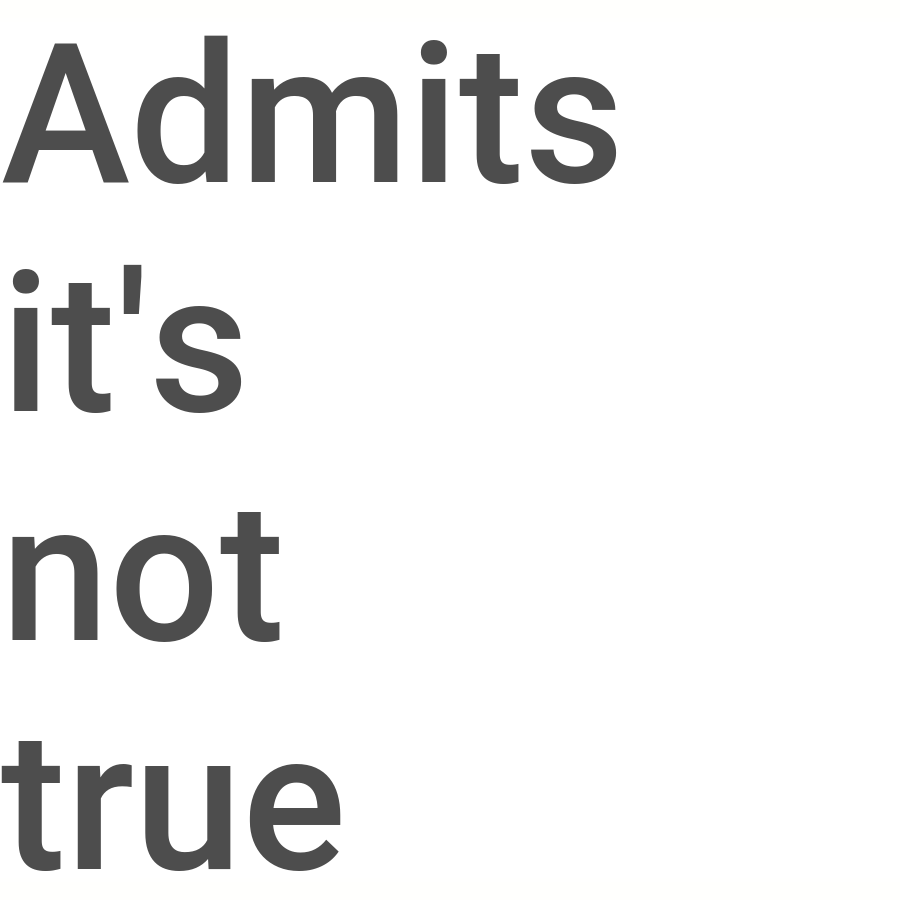 PolitiFact Rating:
PolitiFact Rating: 